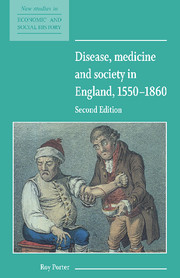Book contents
- Frontmatter
- Contents
- Introduction to the second edition
- Introduction
- 1 Disease, death and doctors in Tudor and Stuart England
- 2 The practice of medicine in early modern England
- 3 Experiences and actions: countering illness in the seventeenth and eighteenth centuries
- 4 Medicine in the market economy of the Georgian age
- 5 The medical profession and the state in the nineteenth century
- 6 The role of medicine: what did it achieve?
- Select bibliography
- Index
- New Studies in Economic and Social History
4 - Medicine in the market economy of the Georgian age
Published online by Cambridge University Press: 29 October 2009
- Frontmatter
- Contents
- Introduction to the second edition
- Introduction
- 1 Disease, death and doctors in Tudor and Stuart England
- 2 The practice of medicine in early modern England
- 3 Experiences and actions: countering illness in the seventeenth and eighteenth centuries
- 4 Medicine in the market economy of the Georgian age
- 5 The medical profession and the state in the nineteenth century
- 6 The role of medicine: what did it achieve?
- Select bibliography
- Index
- New Studies in Economic and Social History
Summary
This survey has been arguing that medicine led a chequered existence in the ‘world we have lost’. Although the nation boasted a few great medical scientists – of whom William Harvey, discoverer of the circulation of the blood, and the astute clinician, Thomas Sydenham, are amongst the most eminent – the professional elite had more enemies than friends, and was accused of being monopolistic and self-serving without being able to offer correspondingly successful medical care. Neither the College of Physicians nor the Company of Surgeons did much for medical education or research (the Royal Society, chartered in 1662, was initially somewhat more energetic, staging the first experimental blood transfusions). Attempts by seventeenth-century Puritan reformers and by advocates of the new chemically-based drugs to change the structure of organised medical practice or to establish new theories and therapies met with resistance.
It would be easy to paint a picture of medicine in eighteenth-century England as meandering down the same channel, still unreformed, though still more oligarchic. The Colleges, for example, grew yet more exclusive and nepotistic, mirroring and being sheltered by the Walpolean political system of ‘Old Corruption’. Indeed, that is precisely how nineteenth-century reformers, spearheaded by the journal, the Lancet, founded in 1823 by the surgeon and democrat, Thomas Wakley, viewed things in their crusades against the medical establishment. Historians have commonly endorsed their reading, seeing the eighteenth century as an era of medical stagnation, destined finally to be swept aside in the ‘age of reform’ by a new broom that put an end to privilege and patronage, and created the ‘career open to talent’ [40].
- Type
- Chapter
- Information
- Disease, Medicine and Society in England, 1550–1860 , pp. 27 - 44Publisher: Cambridge University PressPrint publication year: 1995



